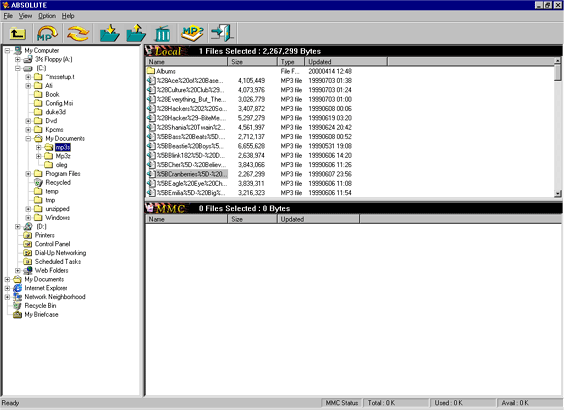Installation
The installation was the easiest phase. In the
package, you get a separate memory card writer, the player and of course all
the required cables. First is the printer cable, it goes from your computer
to the memory card writer. Absolutemm didnít forget about the printer connection,
so they included a shared output. You will need to plug your printer cable
in the memory card writer (output) to use both; in other words, the writer
will simply act as an adapter. If your are a laser printer user, this may
become somehow of a problem as some donít use the same interface.
The writer is powered by 5v; the interesting
part is that you donít need a DC adapter to use it. It's using the power of
your PS/2 port. They included a shared mouse/keyboard cable as well. The cable
has 3 heads, one that will go in the PS/2 port and the other two will be used
for connecting the mouse or keyboard and the writing station.
The next step consists on installing the Absolute
MP3 software (1.12) included on their CD. Unfortunately, we didnít have luck
running it under windows 2000 . As it seems, it's only compatible with windows
98 and 95 for now. The software is very
easy to use, you practically click and drop your MP3 files in another window,
this will immediately start uploading the data to your memory card, once completed
you need to end the process by clicking the MP3 bottom on the upper menu.
When done, replace the card from the write back to the player and you are
set.

The Absolute MP3 Software (1.12)
The audio quality
I was surprised of the audio output using the
included stereo headphones; the sound was very sharp and clear. And by enabling
the SRS option you can experience realistic surround effects. The signal to
noise ratio is estimated at about 85dB, that's around 10dB lower than a standard
CD player.The decibel (abbreviated as dB, and also as db and DB) is a common
unit of measurement for the relative loudness of a sound or, in electronics,
for the relative difference between two power levels. A decibel is one-tenth
of a "Bel", a seldom-used unit named for Alexander Graham Bell, inventor of
the telephone. In sound, the difference between two sound levels is ten times
the common logarithm of the ratio of their power levels. Decibels measure
a scale from the threshold of human hearing, 0 dB, upward towards the threshold
of pain, about 120-140 dB.
As examples: the sound level in the average
residential home is about 55 dB, average conversation is about 75 dB, typical
home music listening levels are about 90 dB, a loud rock band about 110 dB,
and a jet engine close up is 150dB. Decibel units are commonly used in audio
equalizers, both the hardware kind and the software kind, as a convenient
reference point while editing. Boosting an equalizer band whose center point
is 1000 Hz by 3 dB means that you have raised the volume level of that frequency
band by 3 dB as it relates to the other frequencies in the sound. A typical
equalizer has a range for boosting or diminishing a sound level of +/-18 dB.
|
Positives
(+)
|
- Compact Size
- Great sound
quality
- Reasonable
Price
- Up to 128MB
of data
|
|
Negatives
(-)
|
- No USB interface
- No LCD screen
- No Windows 2000
Support (yet)
- Comes with only
16MB of memory
|
Conclusion
Being sold at an estimated 90$USD with 16MB of
memory, this player could end up being an interesting product. We did a little
Pricewatch search and found that this
product is somehow well priced. Altough we found several MP3 players with
bigger potential for around 140$ and in that you get 32MB of memory. This
will be up to you to decide. A good example
is the first revision of the DIAMOND RIO player.
We found it for as low as 131$ (32MB). If you really can't afford adding an
extra 40$ for the RIO, the SoundMaster would be the one to consider.
Oleg Mitskaniouk
21st May, 2000